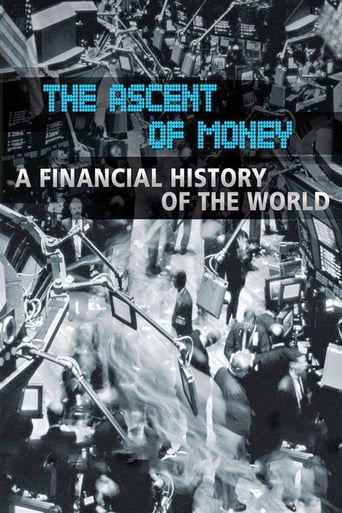



Too many fans seem to be blown away
hyped garbage
Excellent, smart action film.
The acting is good, and the firecracker script has some excellent ideas.
View MoreFerguson is good, very good at times. I have read several of his books and now I just watched this 6 episode TV series, "The Ascent of Money". There has been good and longer reviews in the NY Times and Guardian newspapers. Here are just some quick critical points:1. You get the impression that all economic inventions (Smith, Law, Mattesson etc.) come from Scotland, which is at least somewhat of an exaggeration (Ferguson's home country)2. Ferguson gives much time to one economist, Milton Friedman, but without much critique. Maybe he should not have worked for Pinochet, but in the long run it was good, Ferguson concludes. Allende is presented as a bad economist, a simple Marxist, nothing about US involvement in the coup. 3. There is no "too big to fail", no critique of the big banks, no critique of how banks control American politics through donations. George Soros get criticized, as a representative of Hedge Funds, but that is it. 4. Ferguson is jumping back and forth without reaching convincing conclusions in each part. Ex. The jump from history of money to insurance. 5. The presentation of the history of the welfare state is strange to say the least, grabbing on to one example, the Japanese, without discussion or even mentioning the start in Germany of the spread to Scandinavia. 6. You get the impression Ferguson is too fond of the wealthy, ex. Ken Griffin. In interviews with them we are very far away from "Hard Talk". 7. It is "the market which has gone mad" not individuals, not manipulators, not bad companies, with one exception, Enron. You get the impression Ferguson only attacks those who already lay down, or who have fallen. 8. "Chimerica" as explained by Ferguson does not really explain anything, it at the most a catchy word. Indeed he goes far to destroy it himself at the end. It's a good series overall, but there are at the same time too many troublesome interpretations, strange selections and too much support of globalization and American status quo for it to be truly insightful.
View MoreThought I'd get around to reviewing this excellent six part series I watched in mid 2009. Good thing I made some notes to jog my memory. If you've seen Michael Moore's excellent documentary "Capitalism: A love story", you may remember Moore asking an expert what a "derivative" was and being amused by that expert's inability to describe it. Well, in "The ascent of money", film maker Niall Ferguson doesn't target such straw men...if you want an extremely detailed and forensic account of the many reasons why the financial markets collapsed in 2008, Ferguson is your man.The series itself is an odd bod. The first episode didn't really hold any interest for me, which is why I'm not scoring this series a perfect 10/10. It's as if the nature of the series all of a sudden changed in the wake of the global financial crisis. After the first episode, the rest of the series hones in on the reasons for this crisis. However, there are many interesting historical stories which are either interesting for their own sake, or because they tie-in with what went wrong during the 2008-09 crisis.Some of the topics I found interesting in the series were: Episode 2:The role of the Jewish bankers the Rothschilds in defeating Napolean and the Confederates (in the American civil war). How the Nazis rewrote that history is also covered.Episode 3: How the Scot who owned 25% of the US caused the French revolution. Parallels between the Enron bubble (which burst late 2001) and the Mississippi bubble of 1719.Episode 4: The welfare state dismantled; rise of futures/derivatives/hedge-funds (the latter being crucial to the crisis of 2008-09).Episode 5: The property booms in English speaking countries; the game of Monopoly; the fall of the landed aristocracy in Britain; Detroit on the verge of communist revolution in 1932!; The "New deal" as a way to avert such revolutionary sentiments and to bring African Americans into the mainstream; the Subprime mortgage crisis in the US.Episode 6: How Britain was the world's largest drug dealer! "Foolproof" financial trading (which was anything but); possible future conflicts between the U.S and rising superpower China.This is a superb series which covers all the issues of the global financial crisis...it's like a mini university course on finance and economic history. It has a lot of historical examples and the most complex modern aspects of economics and finance are dealt with in a lucid manner...you may want to have a pen and notepad handy...there's plenty of food for thought here.
View More